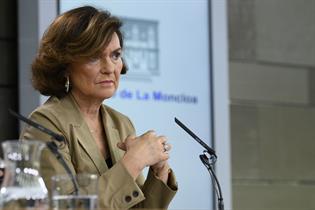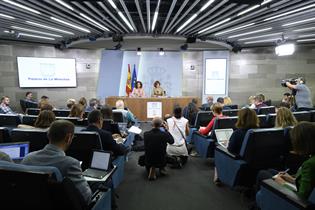Council of Ministers
Government agrees to exhume remains of dictator, Francisco Franco, before 25 October
Council of Ministers - 2019.10.11
The Council of Ministers, following a preliminary report from the State legal services, has agreed to the exhumation, transfer and reburial of the remains of the dictator Francisco Franco in Mingorrubio Cemetery-El Pardo (Madrid).
The Acting Vice-President of the Government, Minister for the Presidency, Parliamentary Relations and Equality, Carmen Calvo, announced that this agreement will lead to the enforcement of the ruling handed down by the Supreme Court on 30 September, adopted unanimously, which brings an end to the judicial review proceedings lodged by the dictator's family to avoid his removal from the Basilica in the Valley of the Fallen.
Carmen Calvo announced that the remains of Francisco Franco will be exhumed prior to 25 October. "I will propose the exact date to the Acting President of the Government when the operational preparations are ready".
His family will be notified of the decision with at least 48 hours' notice and, if they so wish, may attend the exhumation and reburial proceedings. The Acting Minister for Justice will also attend in her role as Commissioner for Oaths of the Kingdom of Spain.
In order to guarantee that these proceedings take place under "conditions of security, efficacy, discretion and respect for human remains" and to avoid any inconvenience to our citizens, the site of the Valley of the Fallen will close temporarily, added the Acting Vice-President of the Government.
Carmen Calvo stressed that the government will provide the right to information that our citizens are entitled to through the media, and hence public spaces will be conditioned to facilitate their work, but "they will not at any time be in close proximity to the proceedings".
The Acting Vice-President of the Government expressed the government's satisfaction at the agreement adopted because, she said, a dictator cannot rest in a State grave. "We would be the only democracy to have a dictator in a place where tribute can be paid to him".
Furthermore, she underlined that 40 years on, this government, in barely 16 months, has pushed through the exhumation of Francisco Franco in compliance with the Historical Memory Act, and that the agreement has been adopted with the "clear and resounding" support of the three State powers.
Measures to alleviate insolvency of Thomas Cook in Spain
 Pool Moncloa/Borja Puig de la BellacasaThe Council of Ministers adopted emergency measures to alleviate the effects that the insolvency of the British business group Thomas Cook is causing in the Spanish tourism sector, particularly in the Balearic and Canary Islands.
Pool Moncloa/Borja Puig de la BellacasaThe Council of Ministers adopted emergency measures to alleviate the effects that the insolvency of the British business group Thomas Cook is causing in the Spanish tourism sector, particularly in the Balearic and Canary Islands.
The Acting Vice-President of the Government explained that the government is offering a rapid, temporary and comprehensive response until other operators re-absorb the situation created in these territories. In this regard, she stressed that the sector "is now starting to fill the spaces left by the company".
The initiatives adopted include the extension of the period of activity of workers on permanent seasonal contracts in the hotel and catering, tourism and trade sectors for companies with work centres in these regions, as well as the extension of the 50% discounts to National Insurance contributions for an additional two months.
Carmen Calvo also announced that the government will open up a line of credit through the Official Credit Institute (Spanish acronym: ICO) for 200 million euros to help companies affected by the insolvency of Thomas Cook. Furthermore, with the aim of recovering the loss of connectivity, consolidating diversification and improving the destination, a direct subsidy will be granted to the Canary Islands for the sum of 15 million euros, and another to the Balearic Islands for the sum of 8 million euros.
The Acting Vice-President of the Government also commented that the government is offering a "reasonable response to a crisis that has taken place" due to the bankruptcy of the British operator with the aim of softening the effects in terms of economic activity and jobs in a sector that is so important for the economy as tourism. She also stressed that the government is seeking legal advice so that, as the case may be, it can bring action in defence of interests that have been harmed, for example, due to non-payment.
5.5 billion euros in extraordinary advance payment to regional governments and local authorities
 Pool Moncloa/Borja Puig de la BellacasaThe Council of Ministers approved a Royal Decree-Law that allows the extraordinary update to the payments on account for 2019 to the regional governments under the common regime and to local authorities. The regional governments will receive 4.68 billion euros while local authorities will receive 821 million euros.
Pool Moncloa/Borja Puig de la BellacasaThe Council of Ministers approved a Royal Decree-Law that allows the extraordinary update to the payments on account for 2019 to the regional governments under the common regime and to local authorities. The regional governments will receive 4.68 billion euros while local authorities will receive 821 million euros.
The Acting Minister for the Treasury, María Jesús Montero, claimed that these amounts, together with the advance payments already settled over the course of the year, amount to a total of 102.8 billion euros for regional governments (a 7.15% increase on 2018 and the highest figure on record) and of 18.88 billion euros for local authorities (up 4.6% on last year).
María Jesús Montero explained that the approval of these advance payments has been possible now after having overcome the initial misgivings of the State legal services, which considered that a caretaker government could not impose this decision on the incoming government's actions. The situation, went on María Jesús Montero, was resolved by calling elections for 10 November, given that the new government cannot be formed until at least December and hence "will no longer be able to control the 2019 accounts".
Furthermore, an analysis of the treasury plans of all the regional governments made by the Ministry of the Treasury has clearly shown that some of them may have difficulties in settling payments as of the month of November, which has led to the declaration of an emergency situation "so that the provision of key public services are not affected", continued María Jesús Montero.
The acting minister highlighted the work carried out to look for solutions within legal parameters, and that this has been the first time that a caretaker government, with an extended budget, has been able to approve the update to the payments of account. "This helps strengthen the political and financial autonomy of the regional governments", she said.
María Jesús Montero considered it necessary for this "precedent" to be taken into account in the upcoming reform of the financing model so that "a budget and institutional block" on Central Government does not prevent the regional governments from receiving "the resources that correspond to them and to which they are entitled".
María Jesús Montero ended by explaining that the Ministry of the Treasury will immediately notify the regional governments and local authorities of the exact amounts that correspond to them and will inform them of the settlement of the financing system for 2019 with a view to their next budgetary forecasts.
95.6 million euros for social security contributions for care-givers
 Pool Moncloa/Borja Puig de la BellacasaThe government authorised a loan to be granted for 95.6 million euros to IMSERSO to finance the social security contributions under the special convention for non-professional care-givers of people in a situation of long-term care.
Pool Moncloa/Borja Puig de la BellacasaThe government authorised a loan to be granted for 95.6 million euros to IMSERSO to finance the social security contributions under the special convention for non-professional care-givers of people in a situation of long-term care.
María Jesús Montero explained that, by doing this, this institution is provided with the funds to take on the cost of the contributions of those people who sign up to this special convention, as provided for in Royal Decree-Law 6/2019, on emergency measures to guarantee equal treatment and opportunities between men and women in jobs and at work.
The Acting Minister for Equality, Carmen Calvo, pointed out that this measure will help alleviate the situation of those people, principally women, who, as care-givers of a person in long-term care, "have their professional careers interrupted, stop making contributions and then have worse pensions".
Application to Constitutional Court for annulment of resolution of Regional Parliament of Catalonia
The Council of Ministers approved the filing of two cases for the enforcement of the ruling of the Constitutional Court, applying for the annulment and immediate suspension of some items of one of the resolutions approved by the Plenary Session of the Regional Parliament of Catalonia on 26 September.
Carmen Calvo explained that its content is not in line with prevailing legislation since it proposes "the right to self-determination, which obviously does not exist in our constitutional model". The government already announced on 27 September its intention to resort to the Constitutional Court, but had to wait for the official publication of the resolution, which took place on 4 October.
Non official translation





